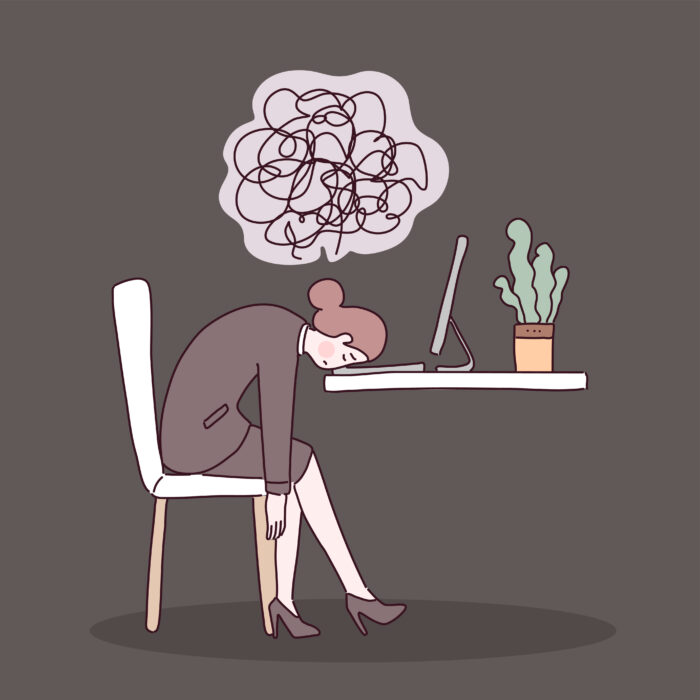To burnout ή αλλιώς η εργασιακή εξουθένωση είναι μια κατάσταση που σχετίζεται με το υπερβολικό άγχος και αυξάνεται ολοένα και περισσότερο σε επαγγελματικά περιβάλλοντα. Τα κύρια χαρακηριστικά του burnout, τα οποία το διαφοροποιούν από παρόμοιες καταστάσεις και σύνδρομα είναι τα εξής:
- Αποστασιοποίηση – όπου διαχωρίζετε τον εαυτό σας συναισθηματικά από τη δουλειά σας.
- Αναποτελεσματικότητα – εργάζεστε όλο και περισσότερο, αλλά αισθάνεστε όλο και λιγότερο παραγωγικοί και αποδοτικοί.
- Συναισθηματική εξάντληση – νιώθετε ότι δεν έχετε δύναμη, ενέργεια και κουράγιο να αντιμετωπίσετε την κάθε ημέρα.
Τι μπορεί να οδηγήσει σε burnout;
Οι παράγοντες που θα μπορούσαν να οδηγήσουν σε εξάντληση δεν είναι αποκλειστικά επαγγελματικοί. Είναι σχεδόν οτιδήποτε πρέπει να επενδύσετε σε αυτό, όπως η οικογένεια, οι φίλοι, οι σχέσεις, ο κοινωνικός ακτιβισμός, ακόμη και το οικονομικό κομμάτι. Σχετίζεται με τη συνεχή προσπάθεια και το άγχος για την ικανοποίηση των προσδοκιών σας σε αυτούς τους τομείς, αλλά καταλήγει στο να μην εκπληρώνετε αυτούς τους στόχους, οδηγούμενοι σε εξάντληση.
Τι είναι ο κύκλος του στρες και γιατί είναι σημαντικός;
Υπάρχουν συγκεκριμένες διαφορές μεταξύ του στρες, των στρεσογόνων παραγόντων και της απόκρισής μας στο στρες.
Οι στρεσογόνοι παρα΄γοντες είναι οι παράγοντες που συμβάλλουν/πυροδοτούν το στρες. Αυτοί οι παράγοντες μπορεί να σχετίζονται με την εργασία/επιχείρηση, τα χρήματα, την οικογένεια κ.λπ.
Το στρες είναι το φυσιολογικό κομμάτι που συμβαίνει στο σώμα σας ως απόκριση σε οποιαδήποτε αντιληπτή απειλή. Οι επιπτώσεις του στρες στο σώμα μπορεί να εμφανιστούν ως δυσκολία στην αναπνοή, κρίσεις πανικού, θολή όραση, προβλήματα ύπνου, κόπωση, πονοκέφαλοι, πόνοι στο στήθος, υψηλή αρτηριακή πίεση, καούρα και δυσπεψία.
Απόκριση στο στρες, το πώς αντιδρούμε δηλαδή στο στρες, που συμβαίνει με το γνωστό freeze, fight or flight, δηλαδή «πάγωμα, πάλη ή φυγή».
Όπως φαίνεται, ο κύκλος του στρες έχει 3 κύρια στάδια:
1) Απειλή, ο στρεσογόνος παράγοντας, τί προκαλεί το στρες.
2) Απόκριση, πώς αντιδράτε στην απειλή, ή πιο σωστά πώς αντιδρά το σώμα σας στην απειλή.
3) Ολοκλήρωση/Τέλος, όταν το σώμα έλαβε το σήμα ότι έχει ‘δραπετεύσει’ από αυτήν την απειλή και είναι πλέον ασφαλές.
Τα τελευταία ευρήματα των ερευνών υπογραμμίζουν ότι οι συμπεριφορές που αντιμετωπίζουν τους στρεσογόνους παράγοντες δεν είναι πλέον οι συμπεριφορές που αντιμετωπίζουν το στρες καθ’αυτό στο σώμα μας. Με άλλα λόγια, όταν είμαστε υπό πίεση λόγω υπερβολικού φόρτου εργασίας, ή μιας δύσκολης σχέσης ή ακόμα και μιας αγχωτικής μετακίνησης προς το γραφείο, τι κάνουμε; Πηγαίνουμε σπίτι και χαλαρώνουμε, ή επιλέγουμε να είμαστε μόνοι για να μην έρθουμε σε επαφή με κανέναν άλλο κ.λπ., που σημαίνει ότι καταλήγουμε να αντιμετωπίζουμε τον παράγοντα του στρες (φόρτο εργασίας, σχέση, μετακίνηση) αλλά δεν αντιμετωπίζουμε το στρες καθ’αυτό και το πώς εκδηλώνεται μέσα στο σώμα μας.
Πρέπει να περάσετε μέσα από τον κύκλο του στρες για να το φέρετε εις πέρας. Έτσι, όταν κάποιος σας λέει «πρέπει να χαλαρώσεις», δεν βοηθά ουσιαστικά στο να επανέλθεις από ένα burnout. Πρέπει να αντιμετωπίσετε το στρες στο σώμα σας. Πρέπει πραγματικά να αλλάξετε τη σωματική σας κατάσταση, σε κατάσταση ασφάλειας. Είναι σημαντικό να χρησιμοποιείτε το σώμα σας για να του δείξετε ότι είναι πλέον ένα ασφαλές μέρος.
Η έρευνα δείχνει ότι υπάρχουν πολλοί τρόποι που βασίζονται σε επιστημονικά αποδεδειγμένα στοιχεία για να βοηθήσουν τους ανθρώπους να αντιμετωπίσουν τον κύκλο απόκρισης στο στρες, όπως το περπάτημα, το τρέξιμο, κάποιες έντονες ασκήσεις και πολλά άλλα.
Η επίγνωση του σώματος μας είναι το κλειδί εδώ. Συνήθως δεν αναγνωρίζουμε τα δύσκολα πράγματα που συσσωρεύονται μέσα μας. Η λύση είναι να μπορείς να στραφείς προς τα δύσκολα συναισθήματα με καλοσύνη και συμπόνια. Είναι εντάξει να παραδεχτείτε ότι είστε αγχωμένοι ή θυμωμένοι ή εξαντλημένοι. Μόλις το καταλάβετε, αναρωτηθείτε «Γιατί είναι αυτό εδώ; Τι χρειάζεται από εσάς; Τι πρέπει να αλλάξει;»
Το άγχος είναι σαν ένα τούνελ. Πρέπει να το διασχίσεις.
Πρέπει να περάσεις το σκοτάδι για να φτάσεις στο φως. Οι άνθρωποι αποφεύγουν να το κάνουν αυτό επειδή φοβούνται τα άβολα συναισθήματα και τις αντίστοιχες εσωτερικές εμπειρίες. Ξεκινήστε να εξασκείστε σε όλες τις εμπειρίες μέσα στο σώμα σας. Ξεκινήστε με τα πιο εύκολα συναισθήματα στην αρχή και μετά με τα πιο έντονα και άβολα.
Εμπιστευτείτε ότι το σώμα σας θα βρει τον δρόμο του.
Δεδομένου ότι το burnout συναντάται πιο συχνά στον επιχειρηματικό κόσμο, οι εταιρείες πρέπει να κάνουν ένα βήμα μπροστά και:
Να ενσωματώσουν την αντιμετώπιση του burnout στις πολιτικές και τη συνολική τους κουλτούρα.
Να αναγνωρίσουν τις συναισθηματικές και σωματικές ανάγκες των ανθρώπων.
Να ενθαρρύνουν τους ανθρώπους να συνειδητοποιήσουν και να εκφράσουν πιο ξεκάθαρα το πώς αισθάνονται.
Να εκπαιδεύσουν τους μάνατζερς για το πώς να αντιδράνε και να δρουν όταν οι υπάλληλοί τους δυσκολεύονται με τα συναισθήματά τους.
Η θεραπεία για το burnout δεν είναι η αυτοφροντίδα. Ωστόσο, όλοι μπορούμε να προσανατολιστούμε και να επωφεληθούμε στην/από τη φροντίδα των άλλων. Πρέπει να δημιουργήσουμε ένα υποστηρικτικό σύστημα αγάπης, καλοσύνης και σύνδεσης. Αυτή είναι η βασική αλλαγή κουλτούρας που μπορεί να δώσει τέλος στην επαγγελματική εξουθένωση μια για πάντα. Αν νιώθεις, όμως, ότι δεν μπορείς μόνος/η σου, ένας business coach θα σε βοηθήσει να το καταφέρεις!

